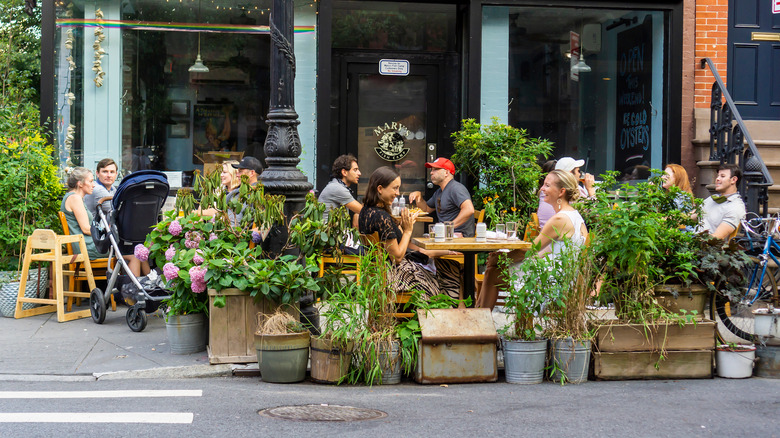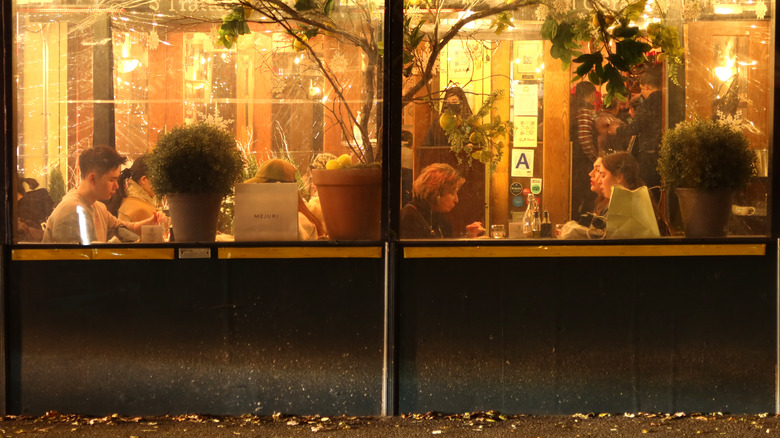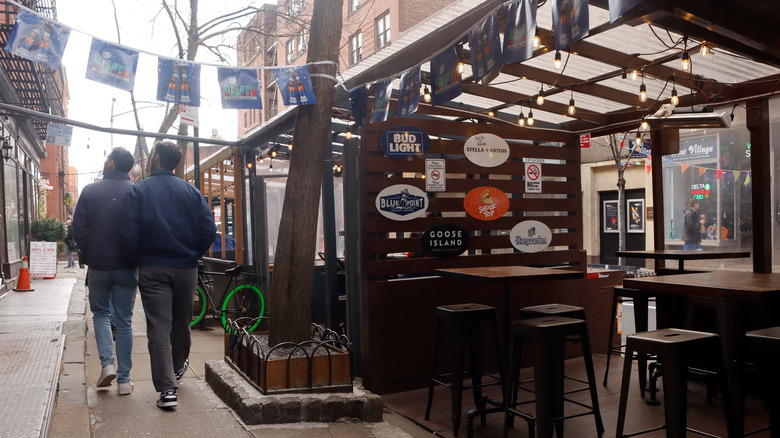NYC Passes Bill To Permanently Make Outdoor Dining Legal
It's no secret that there's no love lost between many New Yorkers and the ragtag armada of outdoor dining sheds that cropped up during the pandemic. Much like a long fast food drive-thru line overflowing into the street, apartment-sized structures in the middle of the road have incited major traffic issues in a city already globally famous for its congestion. Other glaring problems include a lack of parking spaces, uncontrolled noise, a surplus of garbage accumulation, and a spur in rat populations. In some instances, dining structures have been misused as restaurant coat checks or makeshift stand-ins for public housing. On more than one occasion, they've even been hit by cars.
Now, as other COVID-related emergency ordinances continue to roll back, some New Yorkers wonder why outdoor dining has been permitted to remain. The short answer? According to many foodies, it kind of rocks — and now it seems like it's here to stay.
On Thursday, the New York City Council voted 34-11 to make outdoor dining an official part of permanent public policy. But that doesn't mean those massive structures to which many New Yorkers have been getting (willingly or not) accustomed will be sticking around. On the contrary, per the new bill, all those dining sheds will be torn down and rebuilt under new standardized guidelines. Seating restricted to the sidewalk will be allowed year-round with a permit, but larger on-street dining structures will only be allowed from April through November, so the design must allow for deconstruction.
An outdoor dining overhaul with the future in mind
The matter of outdoor dining is a complex issue as it has undeniably helped many businesses well into the post-pandemic days. The mass construction of these structures (aka the Outdoor Dining Program) was approved by former Mayor Bill de Blasio in 2020 in light of the pandemic and the struggling service industry scene. It started as a temporary emergency executive order, but already during their short tenure, the sheds have embedded themselves into the aesthetic zeitgeist of Manhattan streets. Mayor Eric Adams seems to agree, writing in a Tweet, "Outdoor dining is here to stay in New York City. I'm proud to lead the administration that will deliver permanent outdoor dining to New Yorkers. This is our moment to transition to a better program that works for our restaurants, workers, and communities."
Still, not everybody is stoked about the news, including some restaurants that have worked hard to transform their shacks into cozy scenes that customers can (and do) enjoy even during winter months. That has meant the purchase of heat lamps, lights, fans, and other weatherproofing expenses. But the name of the game here is "compromise" — and love 'em or hate 'em, outdoor dining sheds certainly have room for improvement. The Council is calling for regulation and standardization to make these structures sustainable long-term which, with a little urban planning, should be possible.
Reducing the nuisance for New Yorkers
Last December, the New York City Sanitation Department posted a Tweet asking New Yorkers to report any dilapidated or regularly misused dining sheds so that they could be removed, writing, "See a shed that needs to go? Call 311." By January, the city had torn down 169 of them. Even outspoken outdoor dining advocate Mayor Adams himself admits, "The temporary program saved 100,000 jobs, kept restaurants afloat during the peak of the pandemic, and brought new energy and excitement to our streets and sidewalks — but it wasn't perfect," in a statement via CNN. "Too many sheds were abandoned and left to rot and too few lived up to our vision of what our streets should look like."
Exactly how soon New Yorkers can expect to see the city's street cabins torn down and rebuilt remains to be seen. Further guidelines and specifics are still under debate by Mayor Adams' Office and the Department of Transportation, but are expected to be finalized by the end of the year. Earlier this year, revered establishments like Keen's Steakhouse, Tsuru TonTan, and Cellini took their structures down with estimated deconstruction costs of around $100,000. It remains unclear whether the burden of financing this new move will fall on individual restaurants or the city. For now, the Council has shared that restaurants will now be required to pay a fee for their street sheds based on square footage and location, as well as obtain necessary licensure.


